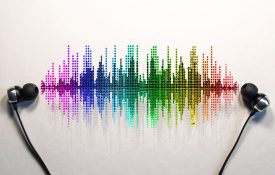-
Sound and vision work hand in hand, UCLA psychologists report
UCLA: Our senses of sight and hearing work closely together, perhaps more than people realize, a new UCLA psychology study shows. “If we think of the perceptual system as a democracy where each sense is
-
Song Recognition
“Memory is essential for making music meaningful,” says Carol Lynne Krumhansl, Professor of Psychology at Cornell University. “Musical emotion is considered to occur in moments when our expectations are violated, with the resolution delayed in
-

Between Speech and Song
Take note! Psychological scientists are doing sound research in the quest for the elusive crossroads where words and music meet.
-
Research on Hearing Communication and Health Gets Center Stage at NIDCD
Behavioral Research at NIDCD by William Yost Examples of Funding for Behavioral Science Research at NIDCD Harnessing the Human Factor in Hearing Assistance by David G. Myers Addressing the ‘Cultural Inertia’ by Caroline M. Kobek
-
Sound, the Way the Brain Prefers to Hear It
New York Times: There is, perhaps, no more uplifting musical experience than hearing the “Hallelujah” chorus from Handel’s “Messiah” performed in a perfect space. Many critics regard Symphony Hall in Boston — 70 feet wide
-
Think You’re An Auditory Or Visual Learner? Scientists Say It’s Unlikely
NPR: We’ve all heard the theory that some students are visual learners, while others are auditory learners. And still other kids learn best when lessons involve movement. But should teachers target instruction based on perceptions

